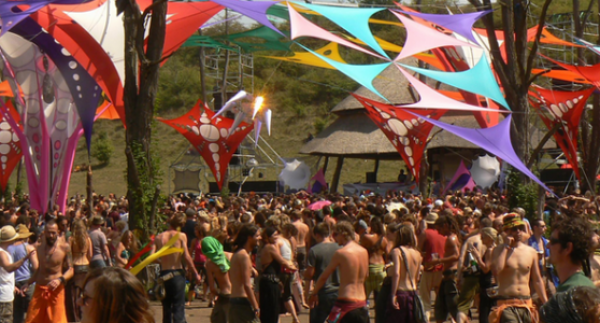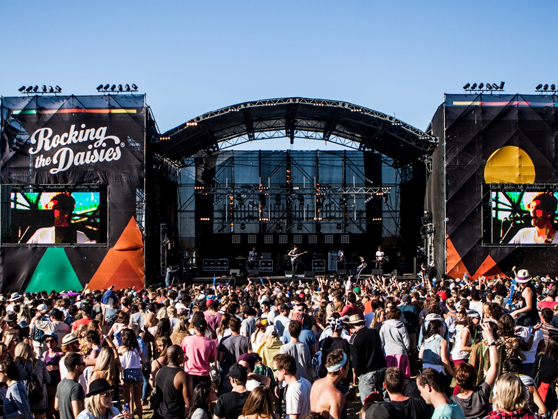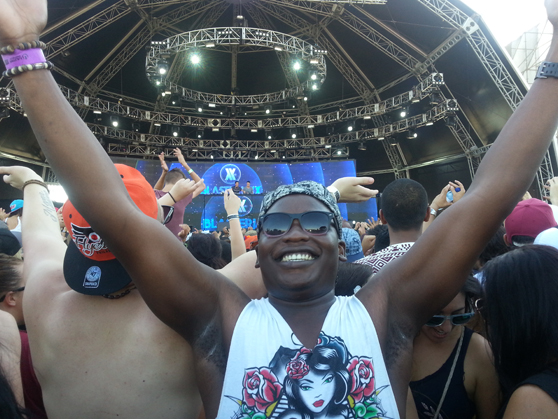Do big electronic dance music festivals spread the love?

From Miami’s supercharged Ultra Music festival to Rocking the Daisies, Cape Town has become home to some of the highest grossing music festivals in the country. Our music journalist, Zethu Gqola, takes a look at how, if at all, four of the biggest festivals have benefitted struggling communities in and around Cape Town.
Thousands of electronic dance music (EDM) lovers from all corners of the country make their way to Cape Town almost every two months. Cape Town has become home to some of the biggest music festivals in South Africa and the biggest music festival on the African continent — Ultra Music Festival.
These events host an array of international DJs costing thousands to book for the gig, and sometimes they take place on the biggest public vending space in Cape Town – the Grand Parade, forcing the street vendors to close or relocate for up to four days as youngsters party the weekend away.
One of the most popular festivals is Rocking the Daisies (RTD) which started in 2006 and now hosts about 15,800 people with tickets costing between R700 and R950 per person for a weekend pass.
Every year, RTD becomes bigger and better, with this year’s lineup said to be one of the most impressive in South African music festival history.
From ticket sales alone, RTD makes over R8 million. But how much of this is used to give back to the community? No one from Seed Experiences, the company which founded RTD, was available for commentary with regards to exact figures.
The festival focuses on its host region – Darling, Malmesbury and the surrounding Swartland. According to its 2012 Event Sustainability Report, the festival focuses on local economic development within the greater Cape Town region, with preference being given to the procurement of local goods and services where possible. Accommodation facilities within the host region and surrounding areas are always fully booked by festival-goers, bringing economic benefit to these sectors.
Festival goers are also encouraged to bring donations to childcare facilities and shelters within Cape Town. But most attendees are unaware of this initiative as it’s not highlighted on the festival’s website. The event report claims an active contribution to the local community through corporate and social responsibility, however this aspect of RTD is not well advertised.

Rocking the Daisies outside Darling in the Swartland will again take place 2 to 5 October. Photo by Zethu Gqola.
The main way RTD tries to give back directly is through Seed the Music Initiative which aims to provide poor schools with musical instruments and music programmes. Together with Young Blood Five and Marshall Music, festival-goers are encouraged to drop off their old, useful musical instruments at Marshall Music stores across the country. These are then donated to the Darling Trust (a charitable trust that assists the community by empowering individuals to help themselves) which makes sure that the instruments end up in the right hands. The actual schools that receive these instruments and music programmes are not stated and no one from Seed Experiences was available to provide any information.
Miami’s supercharged EDM fiesta, Ultra Music Festival, made its way to our shores for the first time this year, and has been confirmed to return in February 2015. The event was held at Ostrich Farm with over 15,000 people attending.
Ultra was headlined by the three biggest EDM DJs in the world: Tiesto, Martin Garrix and Nicky Romero. The tickets for the event cost between R700 (early bird) and R1200 (general admission), and upon its launch it became the biggest electronic festival in African history.
Nowhere on the festival’s website does it mention how the surrounding communities benefitted from this huge event. However, the main sponsor of the festival, DSTV, is known for its DSTV Cares programme. No one was available to comment with regards to Ultra’s direct involvement with surrounding communities. For such a financially successful first-time event, it would be greatly disappointing if there really were no charities that the festival worked with or communities that it gave back to.
Earth Dance prides itself as an eco-friendly festival with a focus on environmental sustainability and improving the way in which resources are used. Festival-goers are encouraged to leave all lights and electronic devices at home switched off, to leave all technology behind, and to enjoy a fusion of nature and music over the last weekend of September.
This festival places great emphasis on giving back to nature and the surrounding communities, donating it claims 50% of its profits to a charity. The festival’s website stresses that attendees should bring old clothing that is still in a good condition to donate to people living in the surrounding communities of Cape Town.
A percentage of the money made from the festival is donated to the Earth Child Project (ECP). This initiative is aimed at giving young children practical skills that they can apply at school and integrate into their lives. The focus schools for the ECP are Sakumlandela in Khayelitsha and Harmony Primary School in Lavender Hill. Programmes include after school clubs for the children, living classrooms, holiday activities and environmental education, outings and camps that equip the children to become leaders while simultaneously protecting their surroundings. The teachers from these schools are invited to conventions that teach them how to become better educators with regards to protecting and looking after the environment using simple, everyday tools.
The Cape Town Electronic Music Festival (CTEMF) takes over the Grand Parade every year in February, attracting over 10,000 party stompers to central Cape Town. Supported by the Western Cape Department of Cultural Affairs and Sport, CTEMF hosts workshops throughout the festival through what they call the CTEMF Open End. The workshops are held in Langa at Guga S’Thebe in association with Bridges for Music with the aim of spreading the culture of electronic music in poor areas, creating cultural exchange between local and international artists and the residents of Langa. The workshops are free and open to all to attend. They take place throughout the the festival, starting a week prior to the event.

Ultra Music Festival will return to Cape Town on 13 February 2015. Photo by Zethu Gqola.
At the workshops, youngsters are given talks by some of the world’s biggest DJs. These mentors explain the roles of managers, booking agents and publicists, while giving youngsters valuable information on how to launch a music career. Kids are given the opportunity to have one-on-one sessions with the musicians.
The abovementioned electronic music festivals make millions of rands every year, and it’s because of such great profits that they have been able to become annual events. Every one of them has investors and is sponsored by more than one multi-million rand corporate enterprise.
These sponsors pay for the event preparations, venue bookings, security and on-site staff, marquees and space rentals, admin staff, advertising and for the artists who perform throughout.
When a festival reoccurs as frequently as the abovementioned, the venue rental fee is usually negotiated and discounted as a long-term partnership forms between the festival and property owners.
The festivals themselves generate an income that is untouched and separate to the set-up costs, unless they have to cover damages to the venue or pay environmental fines.
The environmental effects of these events aren’t always positive, however they do a good job at encouraging people to give each other lifts (to limit air pollution) and at cleaning up after themselves, most of them having a ‘party hard, tread lightly’ policy. Even the We Are One/Holi One colour festival tries to assure people that the powder paint thrown in the air is eco-friendly.
The festivals don’t create employment opportunities as staff is sourced from existing companies to ensure the safety of attendees, and if anything, they slow down business, specifically in the case of clothing vendors at the Grand Parade.
It is greatly disappointing to find that these festivals with one exception generate millions of rands but do not directly financially benefit the communities of Cape Town. Organisers of some of these events seem to feel that is sufficient to merely host a free workshop here and there with industry professionals and ask patrons to donate their old clothing.
Readers can contact Zethu on email: zethugqola [at] gmail.com
Next: Amakrwala

This article is licensed under a Creative Commons Attribution-NoDerivatives 4.0 International License.


